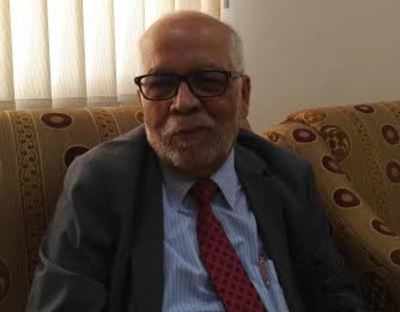
NEW DELHI: With elections in India done and dusted, and the Narendra Modi-led government having returned to power with a majority, Nepal is again looking at India to revive the Saarc summit process. In an exclusive interaction with TOI on Thursday, Nepal ambassador to India Nilambar Acharya said that Bimstec, which India is looking to shore up, cannot be a substitute for Saarc.
The ambassador also said that Saarc had nothing to do with bilateral disputes and that the region cannot grow rapidly without cooperation among South Asian nations.
"Bimstec is a good vehicle for a connect with southeast Asia but it should not be promoted at the cost of Saarc. Or vice versa," said Acharya.
"Saarc has definite and specific objectives. It's important for rapid progress of the region. Saarc is very much about South Asian culture, identity and also diversity marked by similarities. It has a historical legacy," added the ambassador, who has served in the past as Nepal's law minister.
As Nepal PM KP Oli has repeatedly stated, Nepal, as current Chair of Saarc, wants to revive the Association. In seeking a Saarc summit, which has remained stalled since the Uri attack in 2016, Nepal's position is at odds with India which believes Pakistan, the venue for the delayed summit, has not done enough to address the issue of cross-border terrorism. Modi is unlikely to travel to Pakistan anytime soon to allow the summit to take place. The presence of Pakistan in Saarc is the main reason why India is looking to promote Bimstec. As foreign minister S Jaishankar said Thursday, even apart from terrorism, there were issues concerning trade and connectivity which made progress on Saarc difficult.
Acharya, however, said if Modi and his Pakistan counterpart Imran Khan could together attend the SCO summit, they could also consider attending Saarc without having a bilateral meeting.
"At least in collective they will be together at SCO. Saarc is also collective in the sense that no bilateral issue is allowed to be raised (as per the Saarc charter). And India and Pakistan are anyway working together on the Kartarpur corridor," said Acharya, even as he ruled out any chance of the Saarc issue coming in the way of bilateral ties.
The ambassador also called for easier access to India for Nepal exports to bridge the widening trade deficit between the countries. The ambassador expressed hope that the Eminent Persons' Group report, which seeks a review of the 1950 India-Nepal Friendship Treaty, will be submitted to the Indian government soon. On alleged Indian reluctance to accept it, he admitted that the Group had not been successful in submitting the report but added that it should not be seen as India's refusal to accept it.
The ambassador said it was important to build more connectivity between the 2 countries not just in terms of physical infrastructure but also more cultural exchanges.
On Nepal's new transit transport agreement with China, aimed at reducing dependence on India, Acharya said Nepal's relations with India and China shouldn't be seen as a zero-sum game. "We see possibilities in our relations with both India and China. One friendship can't come in the way of another," he said.
The ambassador also said that Saarc had nothing to do with bilateral disputes and that the region cannot grow rapidly without cooperation among South Asian nations.
"Bimstec is a good vehicle for a connect with southeast Asia but it should not be promoted at the cost of Saarc. Or vice versa," said Acharya.
"Saarc has definite and specific objectives. It's important for rapid progress of the region. Saarc is very much about South Asian culture, identity and also diversity marked by similarities. It has a historical legacy," added the ambassador, who has served in the past as Nepal's law minister.
As Nepal PM KP Oli has repeatedly stated, Nepal, as current Chair of Saarc, wants to revive the Association. In seeking a Saarc summit, which has remained stalled since the Uri attack in 2016, Nepal's position is at odds with India which believes Pakistan, the venue for the delayed summit, has not done enough to address the issue of cross-border terrorism. Modi is unlikely to travel to Pakistan anytime soon to allow the summit to take place. The presence of Pakistan in Saarc is the main reason why India is looking to promote Bimstec. As foreign minister S Jaishankar said Thursday, even apart from terrorism, there were issues concerning trade and connectivity which made progress on Saarc difficult.
Acharya, however, said if Modi and his Pakistan counterpart Imran Khan could together attend the SCO summit, they could also consider attending Saarc without having a bilateral meeting.
"At least in collective they will be together at SCO. Saarc is also collective in the sense that no bilateral issue is allowed to be raised (as per the Saarc charter). And India and Pakistan are anyway working together on the Kartarpur corridor," said Acharya, even as he ruled out any chance of the Saarc issue coming in the way of bilateral ties.
The ambassador also called for easier access to India for Nepal exports to bridge the widening trade deficit between the countries. The ambassador expressed hope that the Eminent Persons' Group report, which seeks a review of the 1950 India-Nepal Friendship Treaty, will be submitted to the Indian government soon. On alleged Indian reluctance to accept it, he admitted that the Group had not been successful in submitting the report but added that it should not be seen as India's refusal to accept it.
The ambassador said it was important to build more connectivity between the 2 countries not just in terms of physical infrastructure but also more cultural exchanges.
On Nepal's new transit transport agreement with China, aimed at reducing dependence on India, Acharya said Nepal's relations with India and China shouldn't be seen as a zero-sum game. "We see possibilities in our relations with both India and China. One friendship can't come in the way of another," he said.
Download The Times of India News App for Latest India News.
more from times of india news
World Cup 2019
Trending Topics
LATEST VIDEOS
More from TOI
Navbharat Times
Featured Today in Travel
Quick Links
Rajasthan election 2019Andhra Lok Sabha electionGujarat Election 2019Karnataka Election 2019MP Lok Sabha electionMaharashtra election 2019West Bengal Lok SabhaTamil Nadu election 2019UP Election 2019Bihar election 2019UP Election DateAndhra Election DateBihar Election DateAndhra Assembly ElectionLok SabhaMP Election DateMaharashtra Election DateShiv SenaYSRCPTDPWB Election DateJDUCongressBJP newsGujarat Election DateSC ST ActUIDAIIndian ArmyISRO newsSupreme CourtRajasthan Election DateTelangana Election DateTamilrockers 2018Uttarakhand newsSikkim newsOrrisa newsKarnataka Election DateNagaland newsSatta KingManipur newsMeghalaya news
Get the app









